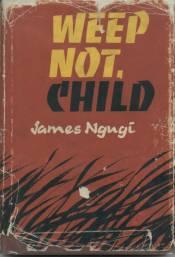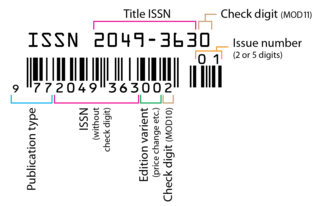The Kikuyu is the largest ethnic group in Kenya. They speak the Bantu Kikuyu language. At a population of 6.6 million as of 2009, they account for close to 17% of the total population of Kenya.

Ngũgĩ wa Thiong'o is an award-winning, world-renowned Kenyan writer and academic who writes primarily in Gikuyu. His work includes novels, plays, short stories, and essays, ranging from literary and social criticism to children's literature. He is the founder and editor of the Gikuyu-language journal Mũtĩiri.
Meja Mwangi is a Kenyan novelist. Mwangi has worked in the film industry, including screenwriting, assistant directing, casting and location management.

Murang'a County is one of the counties of Kenya's former Central Province. Its largest town is Murang'a its capital, called Fort Hall in colonial times. It is inhabited mainly by and is considered the home of the Gikuyu, the largest community in Kenya. The county has a population of 942,581.

The In-Between World of Vikram Lall is a novel by M. G. Vassanji, published in 2003 by Doubleday Canada. The novel won the Scotiabank Giller Prize that year and narrates a story of Vikram Lall in the colonial and post-colonial Kenya. The title for the novel also inspired the title for Elizabeth Nunez's novel Anna In-Between, published in 2009.

Kenyan literature describes literature which comes from Kenya. Kenya has a long oral and written literary tradition, primarily in English and Swahili, the two official languages of the country.

Weep Not, Child is Kenyan author Ngũgĩ wa Thiong'o's first novel, published in 1964 under the name James Ngugi. It was the first English novel to be published by an East African. Thiong'o's works deal with the relationship between Africans and the British colonists in Africa, and are heavily critical of British colonial rule. Specifically, Weep Not, Child deals with the Mau Mau Uprising, and "the bewildering dispossession of an entire people from their ancestral land." Ngũgĩ wrote the novel while he was a student at Makerere University.
The National Oil Corporation of Kenya (NOCK), is a state corporation of Kenya founded by Act of Parliament in 1981, with a mandate of participating in all aspects of the Kenyan petroleum industry. The company was incorporated in 1981 and began operations in 1984.

Carcase for Hounds is a novel by Kenyan writer Meja Mwangi first published in 1974. The novel concerns the Mau Mau liberation struggle during the latter days of British colonial rule and attempts, by the actions of the main protagonists, to show how Mau Mau was organized and why it took so long for the colonial government to defeat them. Carcase for Hounds received mixed reviews. The novel was also adapted into a movie by Ola Balogun, Cry Freedom.
Dr. James Njuguna Mwangi is a Kenyan accountant, career banker, businessman and entrepreneur. He is the current Group managing director and Group chief executive officer of the Equity Group Holdings Limited, the banking conglomerate with the largest customer base on the African continent, in excess of 12.4 million as of June 2018.. Mwangi was included among The Financial Times' 2009 list of the top 50 thought leaders of emerging markets, and among the top 20 most influential people in Africa.
Moraa Gitaa is a Mombasa-born Kenyan novelist. She is the author of the novels Hila and Shark Attack among other works. She is a Social Protection and Peace & Conflict Studies practitioner. Gitaa was one of the Kenya Chapter winners of the 2014 Burt Award for African Literature and nominated for the 2010 Penguin Prize for African Writing and also won First Prize in the National Book Development Council of Kenya (NBDCK) Adult Fiction literary award in 2008 She is a member of PEN International, the World Association of Writers.

Boniface Mwangi is an award-winning Kenyan photojournalist, politician and activist involved in social-political activism through his initiative Team Courage. Team Courage is a movement that aims to instill a sense of hope and self-belief in a generation of young change makers by enabling patriotic citizens to take bold and effective actions in building a new Kenya. He is known for his images of the post-election violence that hit Kenya in 2007–2008. He is also the founder of Picha Mtaani, a youth-led peace initiative that primarily seeks to create space for young people to reconcile and become agents of reconciliation to their respective communities.
Gabriel Ruhumbika is a Tanzanian novelist, short story writer, translator and academic. His first novel, Village in Uhuru, was published in 1969. He has written several subsequent novels in Swahili. He has also taught literature at a number of universities, and is currently a professor of Comparative Literature at the University of Georgia in the USA.
Kill Me Quick, published in 1973, is a novel by Meja Mwangi. The novel won the Jomo Kenyatta Prize for Literature in 1974.
Kenyan crime fiction is a genre of crime fiction that is set in the country of Kenya, and usually written by Kenyan authors. According to G.J. Demko of Dartmouth College, "The fundamental premise of all [crime fiction] is a society that is ordered and real but becomes disordered as a result of a crime imposed on that society. In the normal case, a hero arrives - an officer of the law, a private detective or an amateur sleuth - and via logical deduction, hard work or luck, solves the crime, identifies the perpetrator, and order is restored." However, Kenyan crime fiction differs slightly from Demko's definition because of the following reasons: crime is often so pervasive in societies portrayed in Kenyan crime novels that it becomes almost a part of the order, and many times crimes are not conclusively solved by the end of the stories, mimicking the real-life cyclical nature of crime.
Eneriko Seruma is the pen name for Ugandan poet, novelist and short story writer Henry S. Kimbugwe. He is the author of the novel The Experience and a collection of short stories titled The Heart Seller. He also wrote poems and short stories for leading East African journals and magazines in the 1960s and 1970s, including for Ghala, Busara, Zuka and Transition'.'
Rebeka Njau is a Kenyan educator, writer and textile artist. She also writes under the name Marina Gashe. Alex Wanjala has said: "Like Grace Ogot, Rebeka Njau is a very important writer in Kenya.... She addresses issues that affect women directly and then demonstrates how women’s issues are symptomatic of a malaise in the larger Kenyan society." According to John Mugubi of Kenyatta University, "The uniqueness and power of Rebeka’s style cannot be understated. She has a penchant for subversion of literary conventions in order to drive points home."
Devil on the Cross is 1980 Gikuyu language novel written and self translated by Kenyan novelist Ngũgĩ wa Thiong'o, which was later republished as part of the influential African Writers Series in 1982. The novel, though dealing with a diverse range of literary conventions and themes, focuses on politically challenging the role of international money and culture in Kenya.








